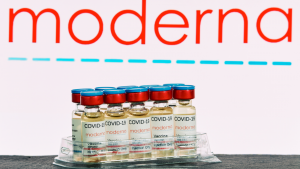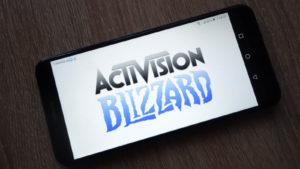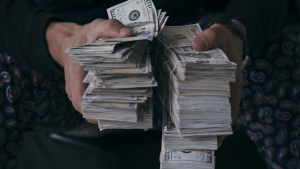Companies of all sizes appear to be hoarding cash for the much-discussed impending recession. If we do dive into a recession, cash-rich stocks will be more than prepared for whatever slowdown comes their way. However, when investing, it’s not enough to look for businesses with cash. They should also have limited debt and strong cash flow generation in good times and bad. So, who are these companies?
For this article, I selected four large-cap and three mid-cap cash-rich stocks to buy. Cash-rich to me means having net cash on the balance sheet. There aren’t many around but with interest rates rising; it’s more important than ever to have manageable finances. To make the cut, a stock must have net cash that’s at least 5% of its market capitalization.
| MRNA | Moderna | $154.59 |
| REGN | Regeneron | $727.32 |
| ATVI | Activision Blizzard | $71.61 |
| CSGP | CoStar Group | $78.07 |
| GRMN | Garmin | $84.60 |
| INCY | Incyte | $76.83 |
| FSLR | First Solar | $149.46 |
Moderna (MRNA)

Moderna (NASDAQ:MRNA) reported Q3 2022 results on Nov. 3. It had zero debt and $8.4 billion in cash and cash equivalents. That’s 14.5% of its current market cap. The vaccine company’s stock wobbled a little on the disappointing news, which included cutting its vaccine sales estimate by $2 billion to $3 billion in 2022. The company cut the full-year estimate due to supply constraints. Where have we heard that before?
“We’ve had quite a number of pain points,” said Moderna CEO Stephane Bancel, as quoted by Barron’s. “We are working through a lot of those issues… There are many lessons to be learned that we are working on.”
It’s easy to sit here in the cheap seats and criticize the company for missing revenue estimates in the quarter by $100 million and cutting the number of its advanced purchase agreements by $2 billion to $3 billion for all of 2022. However, those were merely deferred until 2023. In the end, the company has still generated $7.8 billion in operating profits through the nine months that ended Sept. 30. In fiscal 2020, it had an operating loss of $763 million. It could always be worse for long-time shareholders.
Regeneron (REGN)

Regeneron (NASDAQ:REGN) reported its Q3 2022 results on Nov. 3. While it beat analyst expectations, earnings were down 28% over Q3 2021. In terms of revenues, sales were 15% lower year-over-year to $2.94 billion due to lower numbers from Regen-Cov, the company’s Covid-19 antibody treatment. The good news is that sales beat the estimate by $30 million. Excluding Regen-Cov, the company’s sales rose 11% in the quarter.
REGN stock is up more than 18% on the year as I write this. That’s considerably better than the S&P 500 healthcare sector, which is down 7.5% through Nov. 2. In addition, the biotech had $13 billion in cash and cash equivalents at the end of Sept. go along with $2 billion in long-term debt. Its net cash position is $11 billion, 13.6% of its current market cap. Eylea, the company’s drug to slow vision loss, generated 55% of its revenue in the third quarter. Also, the company is said to be working on a high-dose formulation of the drug that could be approved by the end of the year.
Activision Blizzard (ATVI)

Activision Blizzard (NASDAQ:ATVI) is in the middle of a lengthy regulatory approval process so that Microsoft can buy it for $69 billion.
The European Commission asked Microsoft to submit commitments it would make to satisfy European regulators so that the deal could go ahead. Microsoft made no such guarantees. It now faces a potentially lengthy full-scale probe by the Commission. The regulatory body has until Nov. 8 to announce a Phase 2 investigation.
Phil Spencer, the head of Microsoft’s Xbox business, and the person responsible for ATVI’s integration into Microsoft believes the deal will happen. “I’m pretty confident in the deal closing,” he told The Tech Game. “I think [regulators] are asking good, honest questions about a big deal … it’s definitely the biggest deal I’ve ever done.”
In addition, Berkshire Hathaway (NYSE:BRK-B) has an 8.7% stake in ATVI worth $4.9 billion. The company bought 14.7 million shares in Q4 2021 before Microsoft announced the $95 a share offer in Jan. By the end of Q1 2022, it owned 64.3 million shares. As of June 30, it owned 68.4 million shares, making ATVI the holding company’s 11th-largest position. Berkshire is estimated to have paid $73.28 a share for its Activision Holdings. It will make approximately $1.5 billion from its investment if the deal goes through.
Berkshire Hathaway is also confident the deal will go through. If you’re a risk-taker, ATVI is an excellent case of M&A arbitrage.
CoStar Group (CSGP)

If you work in commercial real estate, you’ve probably worked with CoStar Group (NASDAQ:CSGP). Its reason for being is to provide real estate information, analytics, news, and online marketplaces. Its online brands include CoStar, LoopNet, Apartments.com, and BizBuySell. Relative to the S&P 500, CSGP stock is having a good year, up 1.3%, more than 23% better than the index. Since mid-July, its stock has taken off, up 43% in less than four months. At the end of October, CoStar reported healthy growth in its third quarter.
On the top line, revenues were up 12% YOY, with a 62% increase in net new bookings. That’s significant because CoStar operates a subscription-based business. New bookings mean recurring revenue. That’s the best kind. On the bottom line, its adjusted EBITDA (earnings before interest, taxes, depreciation, and amortization) was $153 million, 6.0% higher than a year earlier.
Those aren’t spectacular results, but they were enough for the company to raise its guidance for 2022. It now expects at least $2.18 billion in revenue and an adjusted EBITDA of $665 million.
As CoStar CFO Scott Wheeler stated in its Q3 2022 press release, “Our financial results in the third quarter and improved 2022 revenue outlook demonstrate the strength of our products and resilience of our subscription-based business model. “We are making great progress with our Residential investment strategy while managing investment levels well below our initial estimates. This results in our improved profit outlook for 2022.”
Garmin (GRMN)

Garmin (NYSE:GRMN) is down from an all-time high of $178.81. Yet, the “Cult of Garmin” remains strong. The company reported Q3 2022 results on Oct. 26 that were mixed from an analyst estimate perspective. On the top line, it delivered sales of $1.14 billion, $70 million shy of the consensus. However, on the bottom line, it beat by eight cents at $1.24 a share.
The good news is that its gross margin increased by 40 basis points in the quarter to 58.8%. As a result, it raised its earnings outlook for all of 2022 to $4.95 a share. The bad news is that the company lowered its revenue guidance to $4.85 billion. A real bright point in 2022 is its Outdoor business. Through the first nine months, the unit’s revenues increased 22% YOY to $1.11 billion, putting it first amongst its five operating segments. More importantly, Outdoor has an operating profit margin exceeding 34%. That’s lights-out good.
Lastly, Garmin finished the third quarter with $1.46 billion in net cash, representing 9.1% of its market cap. Trading at 3.3x sales, it’s cheaper than it’s been since 2016, and it’s got a healthy 3.33% dividend yield.
Incyte (INCY)

Incyte (NASDAQ:INCY) is a biopharmaceutical company with several therapeutics focused on oncology and immunology. By far its biggest product is Jakafi, a prescription medicine that helps keep the production of blood cells under control. It recently raised its guidance for full-year Jakafi revenues to $2.39 billion at the midpoint from $2.38 billion, previously.
In Q3 2022, Jakafi accounted for 75% of its $823.3 million in third-quarter revenue, up from 70% a year earlier. Jakafi delivered 13% growth YOY with overall product sales growing by 20% over Q3 2021. Incyte finished the third quarter with $3.0 billion in cash on its balance sheet and no debt. Its net cash position of $3 billion is a high 17.5% of its market cap. As for analysts, the 21 covering it are moderately bullish, giving it an Overweight rating with an average target price of $86.88, 13% higher than where it’s currently trading.
First Solar (FSLR)

As a Canadian, I couldn’t help but notice the First Solar (NASDAQ:FSLR) press release from Oct. 26 that announced it was supplying Swift Current Energy with two gigawatts of high-performance thin-film solar modules. It was Swift Current’s second big order from First Solar in 2022.
However, it turns out Swift Current has nothing to do with Swift Current, Saskatchewan. It turns out the renewable energy company is based in Boston. The news, regardless of geography, is excellent news for both companies. First Solar is doubling down on its commitment to American manufacturing. It is spending $1.2 billion to expand its Ohio manufacturing facility and open its fourth U.S. plant.
The company recently increased its guidance for net sales in 2022 while lowering its outlook for operating profits. The cause for lower profitability had to do with unexpected additional logistics costs. The good news is First Solar is a business with more than 58 GW of modules yet to be shipped. It also finished the third quarter with $1.93 billion in cash on its balance sheet and zero debt, representing 12% of its market cap. It’s an excellent long-term buy.
On the date of publication, Will Ashworth did not have (either directly or indirectly) any positions in the securities mentioned in this article. The opinions expressed in this article are those of the writer, subject to the InvestorPlace.com Publishing Guidelines.
